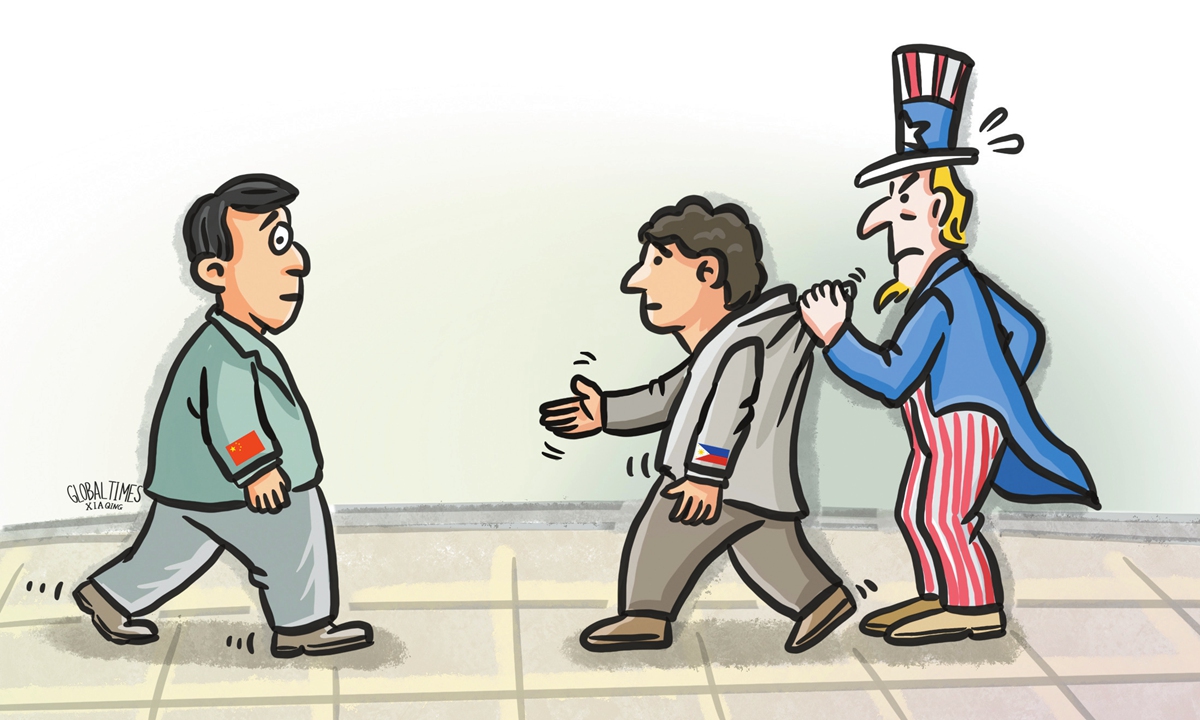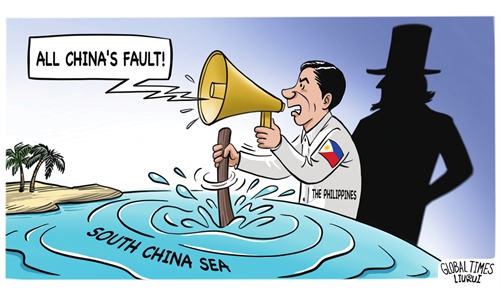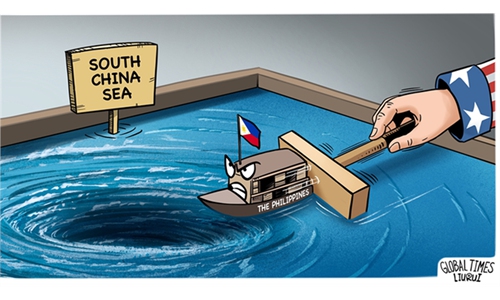
Illustration: Xia Qing/GT
The US-Philippines "2+2" security talks came after much double talk by US Secretary of State Antony Blinken aimed at the recent provisional arrangement between China and the Philippines, which has somewhat reduced tensions between the two countries.
In conjunction with the East Asia Summit Foreign Ministers' Meeting in Laos, Blinken criticized alleged "escalating actions" at sea by China. However, it was the US that has created the tensions in the South China Sea, while hypocritically applauding the China-Philippines de-escalation arrangement.
It should be noted that tensions between China and the Philippines began in early 2023, when retired US Air Force Colonel Raymond Powell, with the help of the US Office of Naval Research, conceived a "cognitive warfare" operation known as "Project Myoushu."
The strategy enlisted Philippine maritime security and defense forces in an "assertive transparency" operation to challenge a 25-year-old practice with China banning construction materials supplies to a corroding, deliberately stranded Philippine Navy ship to boost its claim over Ren'ai Jiao.
The modus operandi was to provoke deterrent or police action from the China Coast Guard. Philippine Coast Guard vessels or privately hired ships attempted to smuggle prohibited materials or violate fish sanctuaries, which are restricted for conservation purposes. These Philippine vessels also transported Western and Filipino media to film, report, and denounce China's actions as "bullying."
Powell, the chief of the US Project Myoushu, openly admits that the aim of his operation is to exact reputational costs on China and generate international support for the Philippine cause. However, both efforts have failed. According to the State of Southeast Asia 2024 survey, compiled by the Singapore-based ISEAS-Yusof Ishak Institute in April, over half of Southeast Asians now prefer to align with China rather than the US. ASEAN member countries are critical of the Philippines' unilateral and disruptive activities.
The concern for Filipinos is that while the de-escalation arrangement may be holding firm at this early stage, it remains fragile as various foreign and domestic elements continue to besiege it with fake news and disinformation.
The visit of Blinken and US Defense Secretary Lloyd Austin will be another opportunity for the US to put pressure on the Philippines to pull out of this de-escalation arrangement.
China and the Philippines have, to some extent, restored peace and stability in the areas of the South China Sea after the two sides reached a provisional arrangement on the transportation and replenishment of humanitarian supplies to Ren'ai Jiao in order to maintain the stability of the maritime situation. The arrangement led to a "successful" resupply mission on Saturday delivering humanitarian goods such as food, water and medicines for the BRP Sierra Madre's Philippine Marines.
The Philippines said in a statement, "No untoward incidents were reported." One of the conditions in the deal is the embargo on construction materials that may be used to rebuild the rust-corroded ship.
Now, de-escalation is being pursued, affirming the deep desire of 95 percent of the Filipino population to devote the national energy to economic recovery instead of the imagined threat to national territory.
Will this effort of the Philippine government to normalize relations with China holds strong over the months and years ahead? The Filipino public is trying to ensure that it will. Protesters are slated to greet the arrival of Blinken and Austin with shouts of: Blinken-Austin - Get Out, Stay Out!
The author is founder of a Manila-based think tank Philippine BRICS Strategic Studies. opinion@globaltimes.com.cn


